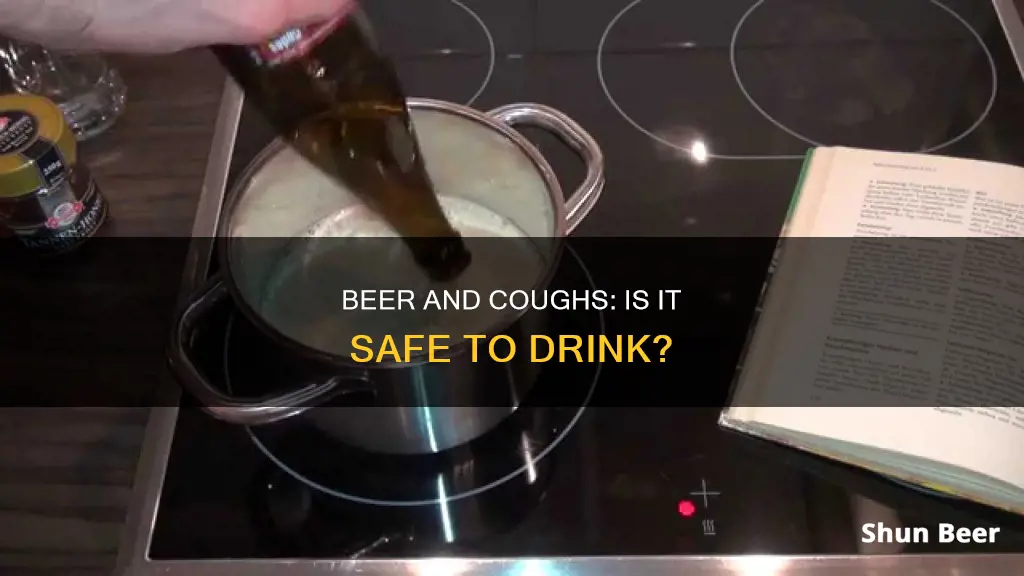
Drinking alcohol when you have a cough is generally not recommended, especially if you are taking cough medication. Combining alcohol with certain cough syrups can lead to increased dizziness, drowsiness, and impaired coordination, and even more severe effects if the medication already contains alcohol. Alcohol can also worsen symptoms, cause dehydration, and weaken the immune system, potentially slowing down your recovery. However, some sources suggest that moderate alcohol consumption may decrease the incidence of the common cold and act as a bronchodilator, improving lung function in people with asthma.
| Characteristics | Values |
|---|---|
| Can alcohol cure a cough? | No, alcohol cannot cure a cough or a cold. |
| Can alcohol help prevent a cough? | There is limited evidence that moderate consumption of alcohol may help reduce the frequency of coughs and colds. |
| Is it safe to drink alcohol when coughing? | It is not recommended to drink alcohol when coughing or ill as it can worsen symptoms, cause dehydration, and weaken the immune system. |
| Can I drink alcohol with cough medicine? | No, combining alcohol with cough medicine can lead to increased dizziness, drowsiness, impaired coordination, and even more severe effects if the cough medication already contains alcohol. |
What You'll Learn
- Drinking beer when you have a cough can cause dehydration and a weakened immune system
- Beer may increase congestion, as alcohol can lead to nasal congestion
- Beer could help fight your cough, as moderate alcohol consumption may enhance immune function
- Drinking beer when taking cough medicine is dangerous and can lead to overdose, respiratory depression and even death
- Drinking beer when you have a cough is not recommended by health authorities

Drinking beer when you have a cough can cause dehydration and a weakened immune system
Drinking beer when you have a cough is not recommended, as it can cause dehydration and weaken your immune system.
When you are coughing, it is important to keep the lining of your nose and throat moist. Fluids help to thin mucus, making it easier to cough out. Beer, on the other hand, is dehydrating. Consuming beer can leave you short of the eight glasses of non-alcoholic fluids recommended daily.
In addition, drinking beer when you are unwell can cause your symptoms to worsen and prolong your recovery. Alcohol can also impair your immune system, making your body more vulnerable to infections and diseases.
There is some evidence that drinking a small amount of alcohol may reduce the number of colds people get per year. However, this is not a cure for the common cold, and excessive alcohol consumption is highly damaging to human health and increases the risk of infection.
If you are taking cough medication, it is even more important to avoid drinking beer. Alcohol can interact dangerously with many common ingredients in cough syrups, such as dextromethorphan, codeine, and guaifenesin. These interactions can lead to increased dizziness, drowsiness, impaired coordination, and even more severe effects.
In conclusion, drinking beer when you have a cough is not advisable. It is better to opt for non-alcoholic, hydrating beverages to help soothe your throat and support your body's natural healing process.
Beer and Milk: Mixing Drinks, Safe or Not?
You may want to see also

Beer may increase congestion, as alcohol can lead to nasal congestion
Drinking beer when you have a cough is generally not recommended. While there is limited evidence that moderate alcohol consumption may reduce the frequency of colds, health authorities still advise against drinking alcohol when you are unwell.
In addition to potentially increasing congestion, drinking alcohol when you have a cough can have other negative effects. Alcohol is dehydrating, and staying hydrated is crucial when you have a cold. Drinking enough fluids helps keep the lining of your nose and throat moist, thinning the mucus so you can easily cough it out. Alcohol can also weaken your immune system, making it harder for your body to fight off the infection causing your cough.
Furthermore, if you are taking any cough medication, it is essential to avoid alcohol. Many cough syrups contain ingredients such as dextromethorphan or codeine, which can have dangerous interactions with alcohol. Combining these medications with alcohol can increase the risk of overdose, respiratory depression, and even death. Even if your cough syrup does not contain these ingredients, alcohol can still intensify the side effects of the medication, such as drowsiness and impaired coordination.
Overall, while there may be some limited benefits to moderate alcohol consumption in reducing the frequency of colds, it is generally not advisable to drink beer when you have a cough. Beer may increase congestion and have other negative effects on your health, and it can interfere with any medication you are taking. It is best to avoid alcohol and opt for other ways to treat your cough, such as drinking plenty of fluids, using saline nasal spray, or trying a drug-free remedy like honey or vapor rub.
Breastfeeding and Beer: Is It Safe to Drink Alcohol?
You may want to see also

Beer could help fight your cough, as moderate alcohol consumption may enhance immune function
While it is generally not recommended to consume alcohol while sick, some studies suggest that moderate alcohol consumption may enhance immune function and decrease the number of colds people get overall. This could be because alcohol influences aspects of the immune response, such as the release of inflammatory cytokines, which may be beneficial for fighting infections in the short term.
For example, a 2012 study compared the rate of colds among 899 males in Japan. Of the participants, 83.4% reported drinking alcohol, and 55.4% reported having at least one cold in the last year. On average, the participants who did not drink at all were more likely to experience two more episodes of the common cold during the study than those who drank 11.5 to 35.8 grams (g), or 0.49 to 1.53 fluid ounces (fl oz), of alcohol per day. This amount of alcohol consumption is equivalent to 1 to 2.5 drinks per day.
Another study suggests that drinking 3–4 drinks per day decreased symptomatic illness after infection with a cold virus (but did not decrease the overall number of infections). There is also some evidence that the hops in beer contain a chemical compound called humulone, which can help the body fight the virus that causes the common cold in adults. However, a single can of beer doesn't contain enough humulone to make a difference.
It is important to note that excessive alcohol consumption is highly damaging to human health and increases the risk of infection. Long-term alcohol misuse causes long-term inflammation throughout the body and can alter a person's gut flora, damage the intestinal lining, and impair the function of immune cells in the respiratory tract. Additionally, consuming alcohol while sick can worsen symptoms, cause dehydration, and weaken the immune system. Therefore, it is generally recommended to avoid alcohol while sick and taking any cough medication.
Beer and Gabapentin: A Safe Mix?
You may want to see also

Drinking beer when taking cough medicine is dangerous and can lead to overdose, respiratory depression and even death
Drinking alcohol when you have a cough is generally not recommended by health authorities. Alcohol is dehydrating, and when you're unwell, it's important to keep the nose and throat moist to thin mucus so you can cough it out. Alcohol can also worsen symptoms, cause dehydration, and weaken the immune system.
Drinking beer when taking cough medicine is especially dangerous. Cough syrup and alcohol can lead to increased dizziness, drowsiness, and impaired coordination, and even more severe effects if the cough medication already contains alcohol.
Certain ingredients found in cough syrups, such as dextromethorphan or codeine, can have dangerous interactions with alcohol, increasing the risk of overdose, respiratory depression, and even death. Dextromethorphan and alcohol are both central nervous system (CNS) depressants, which means they cause relaxation, sleepiness, and a euphoric feeling. When mixed, they cause additive side effects, increasing the risk of overdose.
Some cough syrups that contain codeine or hydrocodone carry a black box warning—the strongest warning required by the FDA—that combining these opioids with alcohol can cause "profound sedation, respiratory depression, coma, and death."
Therefore, it is strongly advised to avoid alcohol while taking any cough medication. Alcohol-free cough syrup formulations are available for those seeking to avoid alcohol in their medication.
Beer: A System Cleanser or Just a Myth?
You may want to see also

Drinking beer when you have a cough is not recommended by health authorities
Drinking alcohol can also weaken your immune system, making your body less able to fight the infection causing your cough. In addition, alcohol can cause or worsen nasal congestion, making it harder to breathe through your nose.
If you're taking cough medicine, drinking alcohol is especially dangerous. Many cough medications contain dextromethorphan or codeine, which are central nervous system (CNS) depressants. When mixed with alcohol, also a CNS depressant, the side effects of these medications can be intensified, increasing the risk of overdose, respiratory depression, and even death.
Some cough medicines also contain alcohol, so you would be combining the medication's effects with even more alcohol. This can lead to increased dizziness, drowsiness, impaired coordination, nausea, vomiting, headaches, fainting, loss of coordination, internal bleeding, heart problems, and breathing difficulties.
Therefore, it's best to avoid alcohol and opt for other beverages when you have a cough. Aim for at least eight glasses of non-alcoholic fluids per day, and steer clear of caffeine, which is also dehydrating.
Beer and Metronidazole: Is It Safe to Mix?
You may want to see also
Frequently asked questions
It is not recommended to drink beer or any other alcoholic beverage when you have a cough. Alcohol can cause symptoms of illness to worsen, cause dehydration, and weaken the immune system.
Combining cough syrup and alcohol can lead to increased dizziness, drowsiness, and impaired coordination. Some cough medications contain central nervous system (CNS) depressants, such as dextromethorphan or codeine, which can have dangerous interactions with alcohol, increasing the risk of overdose, respiratory depression, and even death.
There is limited evidence that moderate alcohol consumption may reduce the frequency of colds. However, excessive alcohol consumption is highly damaging to human health and increases the risk of infection. It is important to note that there is no overall cure for the common cold.







